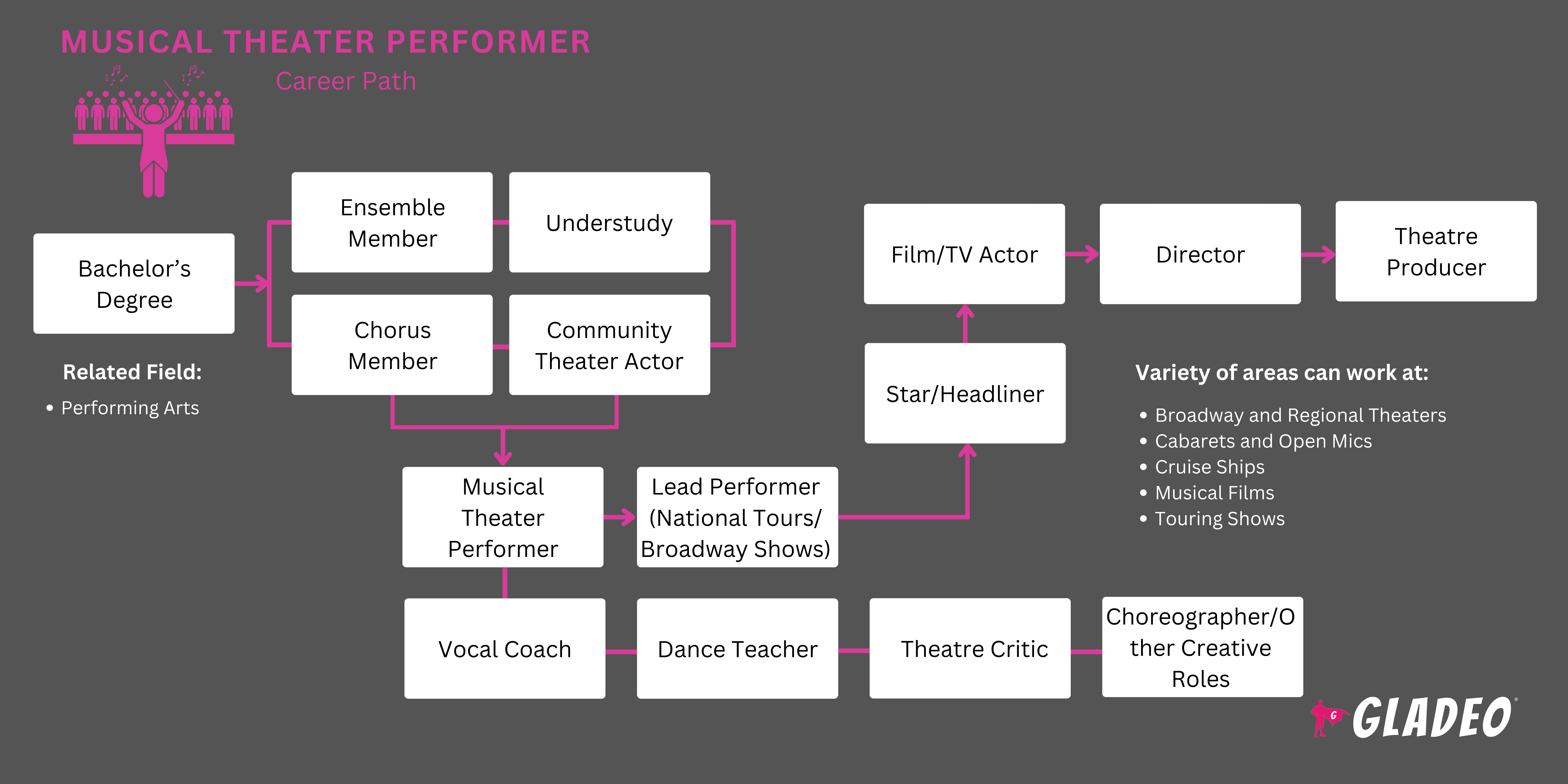Spotlights
Actor, Actress, Comedian, Comic, Community Theater Actor, Ensemble Member, Narrator, Performer, Tour Actor, Voice-Over Artist, Performing Artist
When the curtain rises, Musical Theater Performers bring stories to life through a powerful combination of acting, singing, and dancing. Whether it’s a classic Broadway show or a brand-new production, these performers captivate audiences with their talent, energy, and emotion.
Their work goes far beyond the spotlight—they attend auditions, rehearse for weeks, and collaborate with directors, choreographers, and other performers to create seamless productions. Every performance is the result of hours of training, discipline, and passion.
This is a career for people who love live performance, thrive under pressure, and want to express themselves artistically!
- Performing live in front of enthusiastic audiences.
- Bringing characters and stories to life through song, dance, and acting.
- Traveling or performing in iconic theaters around the world.
- Building lifelong friendships and artistic collaborations.
- Seeing your hard work pay off in applause and standing ovations.
Working Schedule
- Musical Theater Performers typically work evenings, weekends, and holidays. Rehearsals can last 6–8 hours a day, and performance runs may go on for weeks or months. Touring shows involve travel and frequent performances in new cities.
Typical Duties
- Attend auditions and callbacks for new productions.
- Rehearse lines, songs, choreography, and blocking.
- Perform in front of live audiences multiple times a week.
- Work closely with directors, choreographers, and stage managers.
- Maintain physical and vocal health to perform consistently.
Additional Responsibilities
- Record promotional videos or interviews for marketing purposes.
- Participate in community outreach or educational workshops.
- Understudy other roles in the production.
- Stay up to date on new casting calls and industry trends.
- Take additional training in singing, dance, or acting between shows.
A performer’s day often begins with a light workout, vocal warm-ups, and script review. Rehearsals may start mid-morning, involving singing, choreography practice, or working through challenging scenes.
Afternoons are spent resting, preparing costumes, and doing hair and makeup before evening performances. After the curtain falls, performers cool down physically and vocally to prepare for the next show.
While the schedule can be demanding, the energy of a live audience and the bond with fellow cast members make it deeply rewarding.
Soft Skills
- Communication
- Stage presence
- Collaboration and teamwork
- Adaptability
- Emotional expression
- Time management
- Creativity
- Discipline and stamina
Technical Skills
- Acting techniques
- Vocal performance and control
- Musical theater dance styles (jazz, tap, ballet, contemporary)
- Stage blocking and choreography memorization
- Microphone and sound equipment use
- Script and music reading
- Improvisation
- Lead Performers: Star in major roles with solo songs and dramatic arcs.
- Ensemble Members: Perform in group numbers and support the story.
- Understudies and Swings: Step into lead or ensemble roles when needed.
- Touring Performers: Travel with national or international productions.
- Theme Park or Cruise Line Performers: Work in entertainment-based venues.
- Broadway and Off-Broadway productions
- Regional theaters
- Touring theater companies
- Cruise lines and theme parks
- Community theaters and educational programs
- Television and film musical projects
Performing can mean long hours, late nights, and strict physical and vocal care. Rejection is common, and auditions can be competitive. Many performers work multiple jobs or freelance while building their careers.
However, the thrill of live performance, the rush of applause, and the opportunity to do what you love make the journey worthwhile.
Musical theater continues to evolve with new stories, diverse casting, and digital platforms for showcasing talent. Self-taped auditions and online casting calls have become common. Performers are expected to be more versatile than ever, often blending acting, singing, dancing, and multimedia skills.
Many performers loved singing in choirs, acting in school plays, or dancing at local studios. They often enjoyed performing for friends and family, memorizing songs from musicals, and participating in talent shows or drama clubs.
High School Diploma or GED (Minimum Requirement)
- Classes in music, drama, and dance are helpful.
- Participation in school musicals, choirs, or local theater builds early skills.
Bachelor’s Degree or Conservatory Training (Preferred)
- Many performers earn degrees in Musical Theater, Theater Arts, Dance, or Vocal Performance.
- Conservatories and performing arts schools offer specialized, intensive training.
Certifications or Additional Training:
- Vocal coaching and performance workshops.
- Dance intensives or masterclasses.
- Acting technique or improv classes.
- Take theater, choir, dance, or music classes.
- Join drama clubs or audition for school plays and musicals.
- Participate in community theater or youth productions.
- Enter talent shows, competitions, or festivals.
- Build a performance portfolio with headshots, resumes, and clips of performances.
- Attend summer performing arts programs.
- Strong acting, singing, and dancing curriculum.
- Experienced faculty with professional backgrounds.
- Access to performance opportunities and showcases.
- Internships or partnerships with local theaters.
- Career services support for auditions and job placement.
- Professional-level studio facilities.

- Build a strong audition package with a resume, headshot, and vocal/dance reel.
- Audition for community theaters, regional productions, or summer stock shows.
- Attend open calls and casting workshops.
- Network with directors, choreographers, and fellow performers.
- Be open to chorus or ensemble roles to gain experience.
- Keep your skills sharp through regular training and practice.
- Create an online portfolio or personal website to showcase your talent.
- Continuously train to improve vocal, dance, and acting skills.
- Take advanced workshops and masterclasses.
- Audition for more challenging or featured roles.
- Work with a reputable talent agent for professional opportunities.
- Perform at festivals, showcases, and industry events.
- Build a strong network within the theater community.
- Consider union membership to qualify for bigger productions.
- Explore related roles like directing, choreography, or teaching.
Websites
- Backstage
- Playbill
- Actors' Equity Association
- BroadwayWorld
- Casting Networks
- TheaterMania
- Playbill
Books
- The Actor’s Life: A Survival Guide by Jenna Fischer
- Audition by Michael Shurtleff
- An Actor Prepares by Constantin Stanislavski
If performing on stage isn’t the right fit—or you’d like to explore related fields—consider these alternatives that still let you use your artistic skills and theater background:
- Theater Director
- Choreographer
- Voice Coach
- Drama Teacher
- Arts Administrator
- Casting Associate
- Event Performer
- Dance Instructor
Newsfeed

Featured Jobs

Online Courses and Tools







